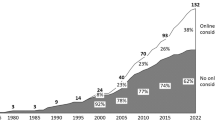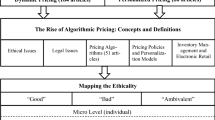Abstract
The paper analyzes the optimal pricing of quality when consumers feel envious of other purchase deals. The influence of envy on the optimal pricing of quality varies depending on whether consumers are concerned about envy in payments or in rents. If consumers compare their payments with those of other consumers, the firm has an incentive to produce lower quality than the first-best level for the high valuation consumer and higher quality than the second-best level for the low valuation consumer. Conversely, when consumers’ disutility from envy arises from envy in rents, the trade-off between efficiency and rent extraction becomes more serious than in the situation where there is no envy.
Similar content being viewed by others
References
Adams JS (1963) Towards an understanding of inequity. J Abnorm Soc Psychol 67: 422–436
Alpizar F, Carlsson F, Johansson-Stenman O (2004) How much do we care about absolute versus relative income and consumption?. J Econ Behav Org 56: 405–421
Amaldoss W, Jain S (2005) Pricing of conspicuous goods: a competitive analysis of social effects. J Mark Res 42: 30–42
Argo JJ, White K, Dahl DW (2006) Social comparison theory and deception in the interpersonal exchange of consumption information. J Consumer Res 33: 99–108
Bagwell L, Bernheim BD (1996) Effects in a theory of conspicuous consumption. Am Econ Rev 86: 349–373
Bearden WO, Etzel MJ (1982) Group influence and product and brand decisions. J Consumer Res 9: 183–194
Bearden WO, Netemeyer RG, Teel JE (1989) Measurement of consumer susceptibility to interpersonal influence. J Consumer Res 15: 473–481
Becker GS (1991) Note on restaurant pricing and other examples of social influences on price. J Polit Econ 99: 1109–1116
Carlsson F, Johansson-Stenman O, Martinsson P (2007) Do you enjoy having more than others? Survey evidence of positional goods. Economica 74: 586–598
Chao A, Schor JB (1998) Empirical tests of status consumers: evidence from women’s cosmetics. J Econ Psychol 19: 107–131
Corneo G, Jeanne O (1997) Conspicuous consumption, snobbism and conformism. J Public Econ 19: 55–71
Diaz M, Rayo L, Sapra H (2007) Status, market power, and Veblen effects. mimeo, University of Chicago
Duesenberry JS (1949) Income, saving and the theory of consumer behavior. Harvard University Press, Cambridge
Fehr E, Schmidt KM (1999) A theory of fairness, competition, and cooperation. Q J Econ 114: 817–868
Festinger L (1954) Theory of cognitive dissonance. Stanford University Press, Stanford
Frank RH (1985) The demand for unobservable and other nonpositional goods. Am Econ Rev 75: 101–116
Gantner A, Guth W, Konigstein M (2001) Equitable choice in bargaining games with joint production. J Econ Behav Org 46: 209–225
Hirsch F (1976) Social limits to growth. Harvard University Press, Cambridge
Ireland NJ (1994) On the limiting the market for status signal. J Public Econ 53:91–110
Johansson-Stenman O, Carlsson F, Daruvala D (2002) Measuring future grandparents’ preferences for equality and relative standing. Econ J 112: 362–383
Johansson-Stenman O, Martinsson P (2006) Honestly, why are you driving a BMW? J Econ Behav Org 60:129–146
Kőszegi B, Heidhues P (2008) Competition and price variation when consumers are loss averse. Am Econ Rev 98: 1245–1268
Laffont J-J, Martimort D (2002) The theory of incentives: the principal-agent model. Princeton University Press, Princeton
Liebenstein H (1950) Bandwagon, snob, and Veblen effects in the theory of consumer’s demand. Q J Econ 64: 183–207
Maskin M, Riley S (1984) Monopoly with incomplete information. RAND J Econ 15: 171–196
Mussa M, Rosen S (1978) Monopoly and product quality. J Econ Theory 18: 301–317
Oswald A, Frijters E, Shields MA (2008) Relative income, happiness, and utility: an explanation for the Esterlin Paradox and other puzzles. J Econ Lit 46:95–144
Rotemberg JJ (2004) Fair Pricing, NBER Working Paper, No. 10915. J Eur Econ Assoc (Forthcoming)
Sengupta J, Dahl DW, Gorn GG (2002) Misrepresentation in the consumer context. J Consumer Psychol 12: 69–79
von Siemens F (2005) Fairness, adverse selection and employment contracts. University of Munich, Munich (Discussion Paper 2005-14)
Siemens F (2004) Inequity aversion, adverse selection and employment contracts. mimeo, University of Munich
Solnick S, Hemenway D (1998) Is more always better? A survey on positional concerns. J Econ Behav Org 37:373–383
Veblen T (1899) Theory of the leisure class. MacMillan, New York
Xia L, Monroe KB, Cox JL (2004) The price is unfair! A conceptual framework of price fairness perceptions. J Market 68: 1–15
Author information
Authors and Affiliations
Corresponding author
Rights and permissions
About this article
Cite this article
Choi, K. Envy and pricing of quality in adverse selection. J Econ 106, 27–43 (2012). https://doi.org/10.1007/s00712-011-0240-x
Received:
Accepted:
Published:
Issue Date:
DOI: https://doi.org/10.1007/s00712-011-0240-x




